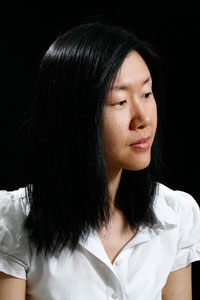I first heard of Ai Khai from news reports about Patcharasri Benjamas, or Kalamare, a TV personality and celebrity who went to Wat Chedi in Nakhon Si Thammarat a few months ago and set off millions of firecrackers near his statue in a show of gratitude.
Ai Khai refers to the spirit or ghost of a boy aged around nine or 10, who is believed to have been a disciple of Luang Pu Thuad, a legendary and revered monk in the southern area who passed away more than 300 years ago.
When the monk arrived at Wat Chedi, which was deserted back then, he found many treasures and ordered the boy to stay and watch over them while he was away on pilgrimage.
However, another legend has it that Ai Khai was only a temple boy who died in an accident but his spirit was still roaming the temple to help people. These are just some of the many mysterious yet miraculous stories told about Ai Khai's spirit over the generations.
It doesn't matter which story about his background is correct. Today, he is respected by people in the South and his wood-carved statue attracts worshippers who believe his spirit can help them with the things they pray for -- wealth, success in business, and good luck.
Kalamare was one of these worshippers. She told the media that she asked for a blessing from the boy's spirit and her wish came true -- she has been able to make 130 million baht from her supplement business. That's why she came back to make a votive offering to his sacred statue and set off a large number of firecrackers, creating 13 million loud bangs back-to-back.
Her success story made big headlines in the media for days as many people came out to criticise her for causing air pollution, citing the thick fumes that billowed from the burning crackers. However, they later became dumbfounded with the explanation that lighting firecrackers is normal practice for successful worship and that Ai Khai liked it.
I don't know whether Kalamare's story has helped increase the popularity of Ai Khai or not but since the story broke, I often hear about people flocking to this temple. However, most of them admitted that they wanted to ask for lucky numbers for lottery tickets.
Even though I don't usually pay much attention to this kind of frenzy, I couldn't help but feel uncomfortable when Wat Huay Mongkol, a famous temple in Hua Hin and home to the world's largest statue of Luang Pu Thuad, declared that it had duplicated several statues of Ai Khai on its temple grounds, one of which is said to be the biggest in the world.
Carved from a giant ancient takhien tree, the replicas were consecrated by a group of senior monks -- one of whom is a high-ranking monastic member of the Supreme Sangha Council -- late last month. Up to 20,000 Ai Khai amulets were also produced and consecrated to be distributed for free. Now, people don't need to travel all the way to Wat Chedi to pray for fortune from Ai Khai as they can go to Wat Huay Mongkol instead.
As a matter of fact, many other temples -- in Ratchaburi, Nakhon Pathom, Pathum Thani, Uthai Thani and Samut Sakhon, for instance -- have already created their own versions of Ai Khai statues, not to mention amulets that have been selling like hot cakes. Moreover, stories about his devotees winning fortunes have been circulating in the media over the months.
It's hard to believe that the presumed sacredness of Ai Khai could be used as a ploy by monasteries to attract visitors. Their logic is that the more worshippers they get, the more money they will receive in donations. Even though several monks at these temples have reportedly said that they created Ai Khai statues because they needed money to restore their old sanctuaries, I don't think the excuse is acceptable.
We can't deny that playing the lottery is a form of gambling in which there is very little chance of winning a fat jackpot. Yet, we keep hearing about people going to odd places and praying to odd things for winning numbers.
In fact, a temple should be a place where we can seek peace of mind and find a path to purify ourselves. It should never play a role in fuelling an obsession with worldly materials, let alone an addiction to gambling.
Even though Buddha never told us to say no to wealth, he taught us to believe in our potential to acquire it through decent means.
Having the necessary skills and perseverance to carry out our work successfully, being watchful with our earnings, making good friends and maintaining a balanced livelihood are the four qualities he said would lead us to happiness and well-being.
It's ridiculous that some of his disciples today, instead, encourage us to rely on the power of a boy's spirit.
Patcharawalai Sanyanusin is a writer for the Life section of the Bangkok Post.
